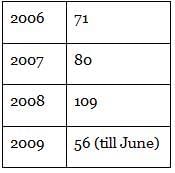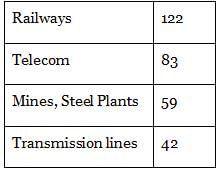UPSC Exam > UPSC Notes > NCERT Summary: UPSC > NCERT Summary: Political Debate - 4
NCERT Summary: Political Debate - 4 | NCERT Summary: UPSC PDF Download
Anti – Development
The Naxals blame the government for poverty, for poor development, and for the absence of basic amenities in the interior areas. And yet, ironically they have adopted an antidevelopment posture. According to a report, the Naxals have, during the period January 2006 to June 2009, attacked 316 economic targets which gave employment to thousands of people including the tribals in different states, particularly those falling in the so called Red Corridor. Home Ministry statistics show the following numbers of attacks on economic targets during the last few years:

The following establishments were particularly targeted:

- In a document Tasks Ahead, the party says that “the people should be educated as to how the entire region is being handed over to the comprador big business houses like the Tatas in Lohandiguda, Essar in Dhurli, NMDC’s proposed steel plants in Nagarnaar and Dilimili, Raoghat mines and the Bodhghat projects.
- The conspiracy should be exposed and a broad-based movement built against displacement.” The land acquisition for Tata’s five million tonne steel project at Jagdalpur has been hampered by the Maoists who have infiltrated the farmers’ outfit seeking better payment and resisting land acquisition.
- Officials allege that the Naxals do not want of any economic activity in the areas of their influence because they feel that once the administration fills up the gaps in infrastructure, their relevance and appeal would diminish.
- Some intellectuals argue that the Naxal opposition stems from the fact that they want more inclusive development. They accuse the government of usurping land in tribal areas with a view to obliging big business houses, who are encouraged to set up economic zones and given concessions for the purpose.
- There may be some truth in the argument, but it is difficult to imagine how the development process could be accelerated without acquiring land somewhere. There could be difference of opinion about the selection of site, but places for setting up big plants will have to be earmarked. Nexus with Insurgents
- The Naxals’ nexus with the insurgent organizations has further exposed them. There are indications that the PW cadres received training in the handling of weapons and IEDs from some ex-LTTE cadres.
- Besides, they have entente cordiale with the National Socialist Council of Nagaland (IM). Some batches of Naxals have also received arms training from the United Liberation Front of Assam. Besides, the Communist Party of India (Maoist) has fraternal relations with the Communist Party of Nepal.
- According to a recent report, the ISI is trying to reach out to the Naxals. The Lashkar-e-Toiba had directed its operative, Mohammed Umer Madani, to recruit Maoists and help them with money and firearms.
- Madani admitted before the police that his plan included giving preliminary training to the jehadis recruited from different parts of India in Maoist strongholds and then sending them to Pakistan for further training.
Extortion
- Extortion is the biggest source of revenue for the Naxals. They extort money from industrialists, businessmen, contractors, government officers and any other function-aries operating in the areas where they operate.
- A major steel company is reported to have been making regular payments to the Naxals, though recently the Naxals attacked it and torched their vehicles when they refused to ferry arms on their planes. According to a confessional statement, the Naxals are extorting Rs. 2 crore from the NMDC every year.
Opium Cultivation
- There are reports that Naxals have started encouraging the cultivation of poppy in certain areas of Bihar and Jharkhand. This is a very ominous development.
- The greatest source of revenue for the Taliban, as is known, is the cultivation of poppy and the subsequent sale of heroin which ultimately finds its way into the markets of Europe and USA.
Boycott of Elections
- The Naxals’ objective is to bring about a Democratic Revolution in the country. India, according to them is a “semi-colonial and semi-feudal country” and the Indian State is completely in the hands of “big landlords and comprador-bureaucrat capitalists”.
- The Naxals methods are however most undemocratic. They always call upon the people to boycott the elections. There are instances of people having their fingers chopped off for having exercised their franchise.
- Polling parties are attacked and occasionally the ballot boxes are looted. It is another matter that people still vote; Gadchiroli recorded over 70% turnout in the recent Assembly elections despite the Maoists’ threats. Intelligentsia’s Support
- The Naxals have the support of a section of the intelligentsia. These mostly include teachers, students and writers. Chhatradhar Mahto, the tribal leader of Lalgarh who was arrested by the West Bengal police, reportedly disclosed the names of 20 Kolkata based University students and three of their professors who have links with the Naxals. According to Mahto, the Naxals occasionally consulted the professors and even took their assistance in drafting policy documents.
- Human Rights groups have a soft corner for the Naxals. There could be no objection to that. But the problem is their blinkered view of the total picture. They project police actions in the most lurid colours but are blind to the excesses and atrocities of the Naxals. It has been rightly said that “our civil society must give up this dangerous flirtation with the ideologies of hatred and murder.” Option before the Government
- The trajectory of Naxal violence has left the government with no option but to undertake comprehensive police operations against them. Unfortunately, certain sections, in their keenness to sensationalise the developments, are painting the government response in gory colours. The proposed action is being described as “war” on the Naxals while some say that it is the beginning of a “civil war” in the country.
- There is no question of a war being waged. The point to be understood is that no government worth the name can remain a mute spectator to its authority and writ over a territorial area being challenged. It has to take action against the elements challenging its authority.
- Be sides, how can you tolerate a group which is attacking police stations, ambushing patrols, extorting money, blowing up schools, disrupting the construction of roads, demolishing communication towers, etc. The activities of such a group have to be put down.
- There is no question of a civil war either. It is not that two groups of the civilian population are fighting against each other. It is a confrontation between the forces of law and order on the one hand and the People’s Guerrilla Liberation Army on the other.
- This is, however, not to absolve the government of its blame - its inefficiency, incompetence, corruption, and failure to alleviate poverty, provide gainful employment and minimise the alienation of land from the tribals.
- It is a sad commentary on our planning process that, as admitted by the Planning Commission in the Eleventh Five Year Plan document, “sixty years after independence, over a quarter of our population still remains poor”. It is distressing that the progress on land reforms has been “dismal”. It is also a matter of shame that, as observed by an Expert Group, the tribals of the country are feeling “totally exhausted, impoverished, and traumatised”.
CONCLUSION
- Poor governance, it must be acknowledged, is at the root of the Naxal problem, and the government is entirely to blame for this. There is adequate justification for the planned police offensive against the Naxals.
- However, there is no justification for the socioeconomic malaise which still afflicts the country. Unless these factors - of poverty, land reforms, unemployment, corruption and alienation of tribals - are addressed, police action would prove to be a temporary palliative only.
- In any case, it is time that the Naxals are exposed for what they are. They claim to be champions of the poor and yet have no compunctions in annihilating people from that section of society. They claim to be protagonists of the tribals and yet they antagonised the tribals of Bastar by interfering with their social customs and cultural practices.
- They shed tears for the poorest of the poor and yet sabotage the schemes to alleviate their poverty. They want to bring about a democratic revolution in the country and yet try to disrupt every election. They claim to be patriots and yet have a nexus with the anti-national forces. The intellectuals’ support for the Naxals has a romantic touch about it. The reality is quite different.
The document NCERT Summary: Political Debate - 4 | NCERT Summary: UPSC is a part of the UPSC Course NCERT Summary: UPSC.
All you need of UPSC at this link: UPSC
|
666 docs
|
FAQs on NCERT Summary: Political Debate - 4 - NCERT Summary: UPSC
| 1. What is the importance of political debates? |  |
Ans. Political debates are important as they provide a platform for candidates to present their viewpoints, policies, and plans to the public. These debates help voters to make informed decisions by gaining a deeper understanding of the candidates' positions on various issues.
| 2. How are political debates structured? |  |
Ans. Political debates are usually structured with a moderator who asks questions, and each candidate is given a specific amount of time to respond. The candidates may also have the opportunity to ask each other questions or engage in direct exchanges. The debate format may vary, but the goal is to provide a fair and organized discussion.
| 3. What are some common topics discussed in political debates? |  |
Ans. Political debates often cover a wide range of topics such as the economy, healthcare, education, foreign policy, climate change, and social issues. These topics are chosen to address the most pressing concerns of the public and to allow candidates to showcase their knowledge and proposed solutions.
| 4. How can political debates influence public opinion? |  |
Ans. Political debates can influence public opinion by providing voters with an opportunity to assess the candidates' competence, credibility, and leadership qualities. The way candidates articulate their ideas, handle tough questions, or respond to criticism can sway public perception and shape their decision-making process.
| 5. Are political debates effective in promoting democratic discourse? |  |
Ans. Yes, political debates play a crucial role in promoting democratic discourse. They encourage open discussions, exchange of ideas, and critical evaluation of the candidates' positions. By allowing candidates to present their arguments and engage in constructive debates, these events contribute to a well-informed electorate and a vibrant democratic system.

|
Explore Courses for UPSC exam
|

|
Signup for Free!
Signup to see your scores go up within 7 days! Learn & Practice with 1000+ FREE Notes, Videos & Tests.
Related Searches

















